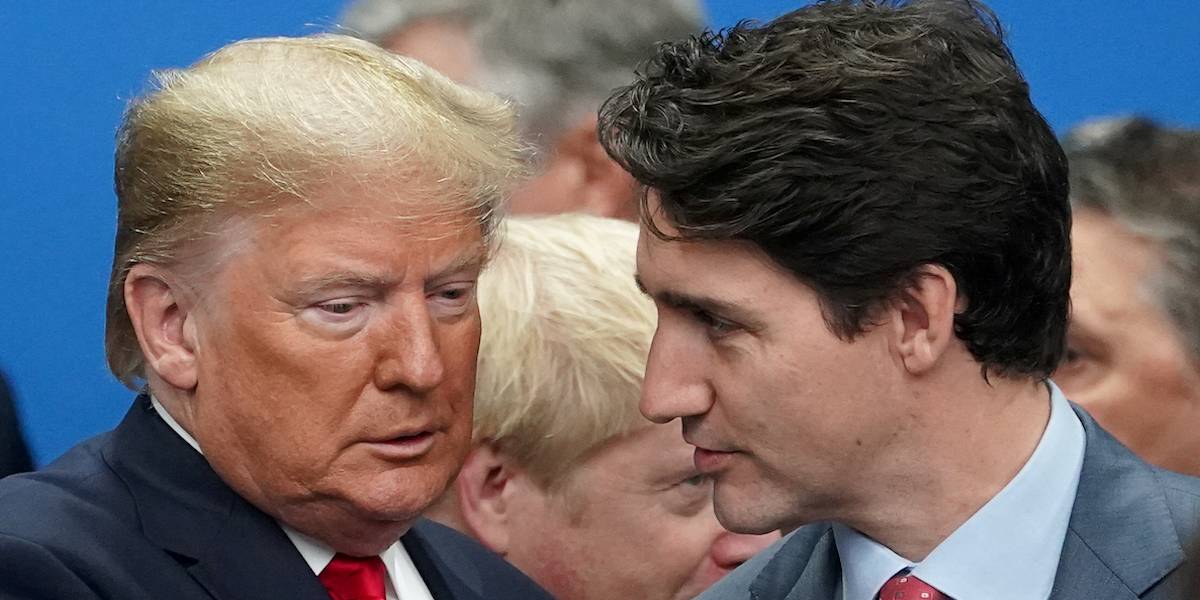Check out this excerpt from the superb new Justin Trudeau biography “The Prince,” written by our very own Stephen Maher. Maher takes us inside the worst moment between Trump and Trudeau. It’s a fight from which their relationship never recovered.
___________
On June 9, at a G7 meeting in beautiful Charlevoix, on the north shore of the Saint Lawrence River, Trump had a temper tantrum that brought relations between the two countries to the lowest point since the War of 1812. He arrived for the summit late and left early. Throughout, he felt put upon by the other leaders, who did not share his agenda and harangued him about tariffs, the unilateral American decision to withdraw from the Paris Climate Accord, and the Iranian nuclear deal. They flatly rejected his proposal that Russia be invited back into the fold. A picture from the event captures the vibe. German Chancellor Angela Merkel is leaning on a table, looking exasperated while Trump, arms folded, looks back, defiant. She is flanked by Emmanuel Macron and Shinzō Abe. Bolton stands next to Trump. The top of [Gerald] Butts’s head is visible behind the leaders.
In his book, Bolton describes the tone of his meetings with Trudeau and Macron: “Trump didn’t really like either Trudeau or Macron, but he tolerated them, mockingly crossing swords with them in meetings ... I assume they understood what he was doing, and they responded in kind, playing along because it suited their larger interests not to be in a permanent tiff with the U.S. president.”
In the bilateral with Trudeau, Trump kept talking about how the markets had responded positively when he and Trudeau shared a friendly handshake. The leaders and their sherpas spent many hours wrangling over a communiqué that was of more concern to diplomats than voters in the countries back home. Butts was working closely with Larry Kudlow, director of the National Economic Council of the United States, and Canadian deputy minister Peter Boehm, trying to find language that Trump and the other leaders could agree on, which they ultimately did. Trump left early, bound for Singapore and then North Korea, where he would hold a summit with dictator Kim Jong Un. He was ready to blow up generations of patient American diplomacy on nuclear non-proliferation in exchange for the opportunity to portray himself as a statesman.
On Air Force One, Trump apparently watched Trudeau’s remarks at the closing news conference and became enraged. “Canadians, we are polite, we are reasonable, but we also will not be pushed around,” Trudeau had said. “I reiterated to President Trump that these tariffs threaten to harm industry and workers on both sides of our border.” It was the same kind of thing Trudeau always said about the trade talks, but there was a difference this time: Trump happened to see the interview. “Suddenly he saw that for the first time,” Trudeau told me in an interview later.
In two tweets, Trump attacked Trudeau and withdrew US support for the communiqué everyone had been wrangling about for two days. “PM Justin Trudeau of Canada acted so meek and mild during our @G7 meetings only to give a news conference after I left saying that ‘US Tariffs were kind of insulting’ and he ‘will not be pushed around.’ Very dishonest & weak.” And then the bombshell: “Based on Justin’s false statements at his news conference, and the fact that Canada is charging massive Tariffs to our U.S. farmers, workers and companies, I have instructed our U.S. Reps not to endorse the Communique as we look at Tariffs on automobiles flooding the U.S. Market!”
Butts was enjoying a celebratory drink in Quebec, toasting a successful summit, when press secretary Cameron Ahmad came in, looking distressed. Ahmad had been relieved that the summit had gone well until he saw Trump’s tweet. “His eyes are bulging,” says Butts. “And he hands me his BlackBerry and I look at him, ‘Is this a joke?’ And then I see the little blue check mark by Donald Trump and it’s like, ‘Nope. It’s not a joke.’ So I call Larry Kudlow immediately.”
Trump asked Kudlow and Navarro to attack Trudeau on the Sunday panel shows, Bolton wrote in his book: “Just go after Trudeau. Don’t knock the others. Trudeau’s a ‘behind your back’ guy.” Navarro may have exceeded his brief on Fox News the next Sunday. “There’s a special place in hell for any foreign leader that engages in bad-faith diplomacy with President Donald J. Trump and then tries to stab him in the back on the way out the door,” he said. “And that’s what bad-faith Justin Trudeau did with that stunt press conference.”
